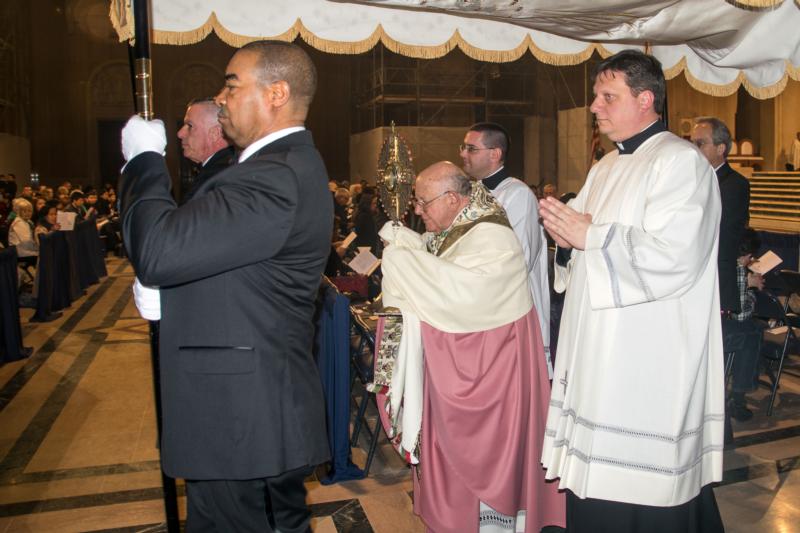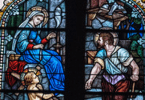
Bishop Paul S. Loverde of Arlington, Va., leads a eucharistic procession March 5 at the Basilica of the National Shrine of the Immaculate Conception in Washington. (CNS photo/Michael F. Flach, Catholic Herald)
by Michael F. Flach
WASHINGTON (CNS) — Bishop Paul S. Loverde of Arlington, Virginia, encouraged Catholics to return home during Lent by trusting in God’s mercy and love, and seeking forgiveness in the sacrament of penance.
“We rejoice because like the prodigal son, we have a heavenly Father whose joy is to forgive,” Bishop Loverde said. “Let us return home because returning home brings joy to his heart. Returning home makes God happy.”
Bishop Loverde celebrated the closing Mass March 5 for Pope Francis’ Lenten initiative “24 Hours for the Lord” at the Basilica of the National Shrine of the Immaculate Conception in Washington.
At the Vatican, in Rome and in many dioceses around the world, Catholic churches had extended hours for confessions as part of the Year of Mercy initiative during the first weekend of March.
At the national shrine in Washington, the observance lasts 48 hours, with continuous exposition of the Blessed Sacrament throughout that time, including overnight hours.
The opening Mass was celebrated March 3 in the shrine’s Crypt Church by Archbishop Timothy P. Broglio of the U.S. Archdiocese for the Military Services. Following the closing Mass, Bishop Loverde led a eucharistic procession around the nave of the shrine’s Great Upper Church. Both liturgies were televised by the Eternal Word Television Network, Catholic TV and New Evangelization Television.
In his homily, Bishop Loverde asked the congregation, “How do we make God happy? How do we bring joy to his heart?
“By coming back home to him,” he said. “By turning away from whatever has separated us from him — our sins — and returning home where he already is looking out on the horizon for us, eagerly awaiting our arrival so he can welcome us back home, embrace us with his mercy, and feed us at the eucharistic table. God is made happy by forgiving us.”
Bishop Loverde said that we sometimes need a reminder of the joy in our midst during Lent.
“We rejoice because, as we heard in the Gospel, our God is exceedingly merciful, and rejoices in offering his mercy to his children as they return home,” he said.
Bishop Loverde shared a reflection by Pope Francis, who, when commenting on the parable of the prodigal son, said: “God is joyful. And what is the joy of God? The joy of God is forgiving. Here is the entire Gospel. Here. The whole Gospel, all of Christianity, is here.”
Bishop Loverde said the story of the prodigal son is probably the most famous parable in the Gospels, and as with anything that becomes too familiar, there is a danger of becoming numb to its meaning.
“So it is a blessing that we have this time to ponder it together once again and to reflect on the many beautiful details Jesus presents about the mercy of our heavenly Father,” he said.
In the parable, the younger son squanders his inheritance before he decides to return to his father, admit his sins and ask for forgiveness, the bishop said.
The father has been waiting eagerly for the return of his son, who begins his act of contrition, but is stopped by his father who cannot wait to share his mercy.
“By his choice and by his sin, the son removed himself from his father’s house,” the bishop said. “When we commit serious sin, we do the same, for we separate ourselves from living in a close relationship with our Father.”
This parable teaches us that we must never lose hope, no matter how grave we believe our sins to be, “for our heavenly Father and his beloved Son cannot wait to offer their mercy to us.”
“The joy of God is forgiving,” the bishop said, “so we must always come to God in our sins, trusting that He will always welcome us. As Pope Francis likes to remind us, God never tires of forgiving us; it is we who tire of asking for forgiveness. May we never tire of seeking God’s mercy.”
Returning to the parable, Bishop Loverde said the father has an older son who refuses to enter the house and celebrate his brother’s return.
The father displays another act of mercy by meeting his older son outside of the house, the bishop said. “This older son’s sin of judgmental pride is keeping him from sharing his father’s joy,” Bishop Loverde explained. “Unlike his younger brother, who was contrite and ready to enter the house, the older son is not ready to forgive, and thus is not ready to be forgiven.
“In his mercy,” the bishop continued, “the father pleads with his older son to count the blessings that he has and to find joy, not condemnation, in the return of his brother, who was lost and now is found. This is how the parable ends, with the words of a joyful father who is eager to show mercy and teach mercy to his children.”
The bishop said we find God’s mercy through the church in the sacrament of reconciliation. He encouraged the congregation to seek forgiveness in the confessional.






